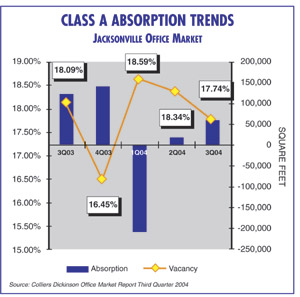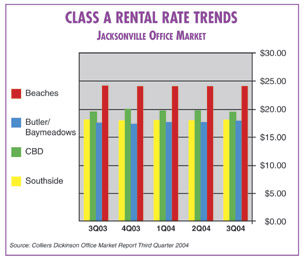|
CITY HIGHLIGHT, DECEMBER 2004
JACKSONVILLE ATTRACTS NEW BUSINESSES
Jacksonville, Florida’s metropolitan statistical area,
which includes Duval, St. Johns, Clay and Nassau counties,
has a population of more than 1.2 million. Expansion Management
Magazine has consistently ranked Jacksonville in the top 10
of its survey of “Hottest Cities” in America for
business relocation or expansion. Jacksonville ranked Number
1 on this list in 1999, 2002 and 2003.
Office
The city of Jacksonville has taken a proactive role in the
city’s overall growth and development by establishing
economic incentive programs to help support multiple commercial
and residential projects. Attracting more people to live downtown
is a major goal for civic leaders. Developers are currently
preparing for several new residential projects in the downtown
area, providing a key component in the renewed strength of
downtown as a place to live and work.

Jacksonville is continuing to grow in every direction, offering
many opportunities for investors. The prime growth area for
office construction is still along Southside’s Butler
Boulevard corridor, extending southward toward St. Johns County.
However, other adequate development sites exist elsewhere
in Jacksonville.
Jacksonville is becoming a major city on everyone’s map.
It has multiple assets and is diverse in many aspects of its
economic, social and geographical environment. There are many
concrete reasons that Jacksonville continues to rank highly
for businesses to relocate or expand.
Jacksonville’s office market has fared better in many
respects over most regional and comparable markets. Nevertheless,
the turnaround from the downturn has been slow. Speculative
construction has been at a low level and it is projected to
remain so until occupancy increases in the Class A office
market. At present, there remain few build-to-suit projects
under construction. Most build-to-suit projects in Jacksonville
are tenant-driven, multi-tenant buildings, resulting in additional
user space coming on line upon completion of these projects.
Of Jacksonville’s 34.5 million square feet of office
space, roughly 10 million square feet is owner occupied, leaving
24.5 million square feet of rentable building area. The average
asking rent in Jacksonville for Class A office space is $19.83
per square foot, while Class B and C is quoted at $15.49 per
square foot. The bulk of deals occurring in the market is
relatively small, in the 2,000- to 10,000-square-foot range,
but bigger deals are also appearing.

Consensus has it that the Jacksonville office market has stabilized.
Minimal new hire or little corporate expansion will likely
continue for the next 6 to 9 months before the beginning of
an upward trend. It is still considered a tenant’s market;
however, landlords are beginning to limit rent concessions
while attempting to improve their income stream. Any significant
increase in rents is not expected until next year. Absorption
will eventually improve with a stronger job market.
— Louis Galant, director of research, and Jenna
Kirk, assistant director of research, Colliers Dickinson
Retail
The population of Jacksonville metro has experienced 9 percent
growth since 2000, now approaching 1.2 million. The retail
prognosis is promising, with another 10 percent increase forecast
by 2009 to 1.3 million residents — nearly one-third of
whom will be in the prime 25 to 44 age bracket.
The Baymeadows/Avenues submarket has performed exceptionally
well during the first half of 2004, with the strongest rent
rates ($21.42) and second-highest occupancies (97.3 percent).
The market overall posted average rents of $14.99 per square
foot with occupancy of 93.24 percent. Baymeadows/Avenues is
bolstered by the super-regional Avenues Mall, which underwent
major renovations in preparation for Super Bowl XXXIX. New
to the submarket is The Sembler Company’s 109,000-square-foot
Southside Shoppes, featuring Best Buy and Sports Authority,
among other retailers, and the first phase of the Shoppes
at Bartram Park, anchored by Publix.
West Beaches continues strong occupancy (98.8 percent), sparked
largely by limited inventory of 1.2 million square feet. However,
new development is on the horizon with Wal-Mart Supercenter
and SuperTarget coming to the area. Significant new development
also is planned for the Regency submarket at the Gate Petroleum
Company’s Kendall Town Center, complete with multifamily,
retail, offices and hotels. Phase I, anchored by a 208,000-square-foot
Wal-Mart Supercenter opening this spring, is slated to be
built out in 6 to 8 years.
As of October 2004, the Jacksonville retail market had sparked
more investor interest than all of last year. Seven strip
center transactions took place through June 2004, compared
with just one during the first 6 months of 2003. Additionally,
the retail market this year is expected to nearly double its
total volume from 2003.
Overall, the Jacksonville retail market is in good shape.
More than 75 percent of the market has occupancies in excess
of 93 percent, and residents can expect more than 3 million
square feet of new retail space over the next 3 years, involving
such major names as Wal-Mart, SuperTarget, Lowes, Best Buy
and Cost Plus World Market.
— John Crossman, senior vice president, director
of retail investment services, Trammell Crow Company
Multifamily
Multifamily trends in the greater Jacksonville area include
an increase in apartment/condominium conversion projects such
as River Reach Apartments on San Jose Boulevard, which AIMCO
is selling to an unnamed developer. As of July 2004, occupancy
was at approximately 92 percent, which is strong overall,
although an almost 2 percent decrease from last year.
Demand for housing in Southpoint on Jacksonville’s Southside,
home to the majority of new development in North Florida,
has increased to the extent that two new developments are
on line from two different developers. Pulte Homes is bringing
forth Ironwood, a 570-unit project on Gate Parkway West, and
Summit Contractors started construction in late June on a
350-unit, 14-building apartment complex on the same road,
which is located just off J. Turner Butler Boulevard, a major
beaches artery.
While the majority of the multifamily development is on the
Southside of Jacksonville, following the growth of office
developments such as Southpoint Business Park and Deerwood
Center, the Better Jacksonville Plan — a $2.2 billion
comprehensive growth management strategy for infrastructure,
roads and other targeted areas of concern — has had the
effect of rejuvenating many other areas of the city such as
east and west Jacksonville, which could reap investment rewards
in the future due to overbuilding on the southside and the
lack of incentive dollars in that area. A prime example of
these “niche” plays is an Atlanta developer bringing
forward a $32 million, 400-unit apartment complex in the Regency
area of greater Arlington in northeast Jacksonville.
Jacksonville is seen nationwide as stable, but very much on
the radar screen of many national companies, as demonstrated
by more than 100 purchases of multifamily properties in 2001
and 2002. With interest rates at the lowest in recent memory
and the city hosting the Super Bowl in just a few months,
look for Jacksonville to continue to compete for a greater
share of the “Sunbelt” investment dollars pouring
into the Southeast.
— Sidney Jones, CCIM, vice president and multifamily
specialist,
Coldwell Banker Commercial-Nicholson Williams Realty
Industrial
Through three quarters of 2004, Jacksonville’s industrial
market has outperformed North Florida’s two other major
areas — Orlando and Tampa. Adjusting for market size,
Jacksonville clearly emerges as the leader among positive
absorption, declining vacancy rates and increasing rent rates.
Warehouse/distribution activity continues to be healthy, posting
12 months of positive absorption buoyed by the outstanding
performance of the Southside and West Side submarkets, where
more than 168,000 and 298,000 square feet, respectively, was
absorbed. Key recent transactions include Kraft Foods North
America Inc., which leased 183,500 square feet in West Side
Industrial Park #4 as a Maxwell House Coffee distribution
center. Transamerica Auto Parts leased 81,000 square feet
in Tradeport Distribution Center VIII, bringing building occupancy
to 73 percent; Decker Inc. leased 11801 Grand Central Pkwy.,
a 168,210-square-foot distribution building with 4,000 square
feet of office space; and 8691 Western Way, a 53,300-square-foot
warehouse built in 1975, sold for $2.4 million in July.
No major lease-only projects are planned in 2005, and only
one (Beachwood Commerce Center — delivery in early 2005)
currently is under construction. Time will tell what impact
emerging warehouse condo construction may have on future development
of (and occupancy of existing) lease-only, multi-tenant properties
in Jacksonville. By year’s end, there will be some 74,000
square feet of industrial condo space available in the Southside
submarket, while another 57,000+ square feet is about to be
completed in West Side.
The overall asking rent for warehouse/distribution space is
nearing $4 per square foot, up $0.60 from a year ago. Rents
are up in every industrial submarket, with average rents ranging
from a low of $2.95 per square foot in Clay County to $5.49
in Butler/ Baymeadows. Direct vacancy has reached its lowest
level in 2.5 years, finishing the third quarter at 16.6 percent.
As previously noted, it remains to be seen how the delivery
of warehouse condos will impact that in the long run. However,
with new construction of lease-only multi-tenant buildings
at a virtual standstill, the upward pattern that began during
the previous four quarters should continue into the near future.
— Brad Chrischilles, senior vice president –
brokerage and Jacksonville director, Trammell Crow Company
©2004 France Publications, Inc. Duplication
or reproduction of this article not permitted without authorization
from France Publications, Inc. For information on reprints
of this article contact Barbara
Sherer at (630) 554-6054.
|
